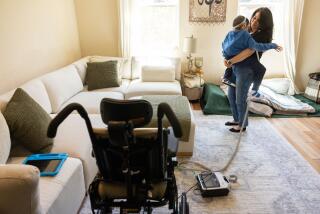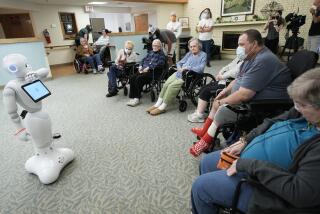Home Care for Elderly Has Its Drawbacks
- Share via
WASHINGTON — Can the nation save money by giving elderly people long-term care at home, so they do not have to use far more costly nursing homes?
That debate has raged for years, with advocates of federally funded, long-term home care pointing out how much money the nation can save.
Care that allows a disabled older person to stay at home--with the aid of someone who comes in for several hours a day or week--can be obtained in many areas for a few hundred dollars a month. Nursing-home care for the same person currently costs about $25,000 to $35,000 a year, sometimes more.
At present, about four-fifths of all home care is provided free by friends and relatives, and approximately 1.5 million of the elderly live in nursing homes.
But policymakers are looking at a rapidly aging population, and many older people will lack relatives to assist them. Two studies recently described in the government’s Health Care Financing Review suggest that the idea of giving people government-paid home care to avoid the expense of nursing homes doesn’t work as well as expected.
The studies involved the use of special authority in California and Georgia to “substitute home and community services for nursing home admissions” that would otherwise have been funded in part by the federal government.
One group of elderly people with disabilities living at home was given special home-care services; a second group with similar disabilities was not. Outcomes were compared.
The problems were outlined by authors James C. Vertrees of the Solon Consulting Group, a health-care consulting firm in Silver Spring, Md.; Kenneth G. Manton of Duke University, and Gerald S. Adler of the Health Care Financing Administration, which runs Medicare. The problems were similar to those noted by some earlier students of the issue:
* Targeting. The experiment found that it was hard to target special services so they are given only to those who otherwise would have gone to a nursing home. The studies showed that many people who received home services would not have ended up in a nursing home, based on comparisons with what happened to the control group.
In California, for example, home service costs were about $350 a month and nursing home costs $1,144. If government spending for home services was effective, then the results of the experiment should have shown that those receiving services had a low rate of institutionalization, while the control group had a substantial rate because it received no services. The experiment, however, found that institutionalization in both groups was extremely low, with less than 2% of those in the control group entering nursing homes.
* Effectiveness. Even though targeting was much better in Georgia, it did not prevent people receiving services from entering nursing homes. The experimental group had the same proportion of members going into nursing homes as did the control group.
“A second unexpected finding for both programs is the apparent lack of service efficacy, i.e., the apparent inability of these programs to actually change the course of events for people bound for nursing homes,” the article said.
The bottom line was that both projects turned out to cost money rather than save it through home services. “For Georgia, as for California,” the report concluded, “the failure of the . . . services to prevent nursing home entry means that the program is not budget neutral.”
The authors cautioned that the results might not apply to all programs. Even so, it appears that more precise targeting techniques and a more exact idea of which home services do best in maintaining people at home are needed to ease the way for eventual congressional enactment of a large-scale home-care program.
But the authors make an additional point: One can view provision of home services as a good in itself. It gives people greater opportunities to continue their accustomed lives, to be near friends or relatives, and perhaps to live a more satisfying and happier life than at a nursing home. The costs of home care may be justified even if they do not save any money on nursing homes, the authors note.
“In other words,” they said, “these programs actually should ultimately be judged against broader social criteria in order to determine if the good that is done by them outweighs their cost.”
More to Read
Sign up for Essential California
The most important California stories and recommendations in your inbox every morning.
You may occasionally receive promotional content from the Los Angeles Times.













